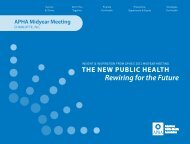EVIDENCE
missingevidence-digitalpdf-singlepages_2016
missingevidence-digitalpdf-singlepages_2016
Create successful ePaper yourself
Turn your PDF publications into a flip-book with our unique Google optimized e-Paper software.
3.30 It has also been suggested that where civil servants are unfamiliar with research methods, this leads<br />
to frustrated communications and tensions with researchers, and ultimately to delay in publishing<br />
results. There is a great deal of research expertise across government; some of this was exhibited<br />
in the insightful responses to this inquiry. But, research is commissioned, overseen, received<br />
and communicated by a wide range of personnel.<br />
3.31 The government social research competency framework (an addendum to the civil service code)<br />
defines the professional competency for members of the social research profession within government<br />
and devolved governments. On reaching grade 5, chief research officer level, a civil servant is expected<br />
to have a thorough and detailed knowledge of research methodology and the evidence base in the field<br />
of policy they work in and to take responsibility for research publication.<br />
3.32 Government sometimes changes what it wants from the research in the course of the project.<br />
For instance, Dr Christian van Stolk of RAND explained that in evaluating a policy impact, departments<br />
may change the outcome measures because of changes in government policy moving or staff<br />
turnover (mainly in the civil service team directing the research), which can lead to shifting priorities.<br />
It can also happen that at the point of publication government changes the format it wants to publish<br />
results in, although according to van Stolk it is more usually the case that there has been little thought<br />
or discussion about that format until publication is imminent. Such changes to the research protocol can<br />
cause tension and delay, which could be avoided if commissioners of research and researchers worked<br />
closely at the outset not only to set the research question but to agree publication plans.<br />
Uncertainty over what counts as research<br />
and differences in the interpretation of rules<br />
3.33 This inquiry has considered how research, defined as the collection and evaluation of data, is published.<br />
It is necessary to bear in mind the distinction between strategic advice, which carries no expectation<br />
of publication, and the data and analysis that underpin it and ought ordinarily to come from or be put<br />
in the public domain.<br />
Jonathan Portes, said:<br />
“[NIESR does] research on the expectation it will be published. There might<br />
be an exemption for strategic advice, but all policy research and programme<br />
evaluations should be published.”<br />
Dr Sarah Wollaston MP, said:<br />
“Ministers need to ask for strategic advice, but the principle is that public funds<br />
pay for research that informs that advice, so should be publicly available.”<br />
3.34 It is evident from what the inquiry was told both by members of the research community and by civil<br />
servants that there is uncertainty about how evidence supplied by private consultancies is to be handled.<br />
Consultants may provide strategic advice but may also conduct research. There is no reason why this<br />
should create confusion between research and consultancy, even if there is some room for overlap.<br />
Where this might be applicable, civil servants should establish in advance that research findings<br />
and strategic advice will be provided in separate reports.<br />
3.35 There is further uncertainty over how other types of research, such as internal fact-finding or evaluation<br />
studies, fit into the publication rules. Case Study 9 shows that research into the effect of fracking<br />
on house prices was not published because Defra considered it to be an internal report. When it was<br />
released in response to an Environmental Information Request it<br />
was heavily redacted.<br />
There is uncertainty about<br />
how evidence supplied<br />
by private consultancies<br />
is to be handled.<br />
SECTION 3: REASONS FOR THE DELAYED PUBLICATION OR WITHHOLDING OF GOVERNMENT RESEARCH<br />
28



